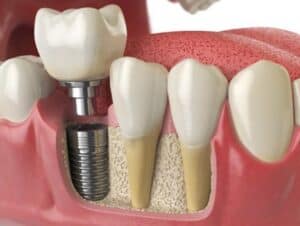What Is A Periodontist?
A Periodontist is a dentist who specializes in the prevention, diagnosis, and treatment of periodontal (gum) disease, and in the placement and maintenance of dental implants. Periodontists receive extensive training in these areas, including three additional years of training after dental school.
By choosing a specialist you will benefit from the latest procedures for treating periodontal disease and placing dental implants tailored to your needs. In addition, we can perform cosmetic periodontal procedures to help you achieve the smile you desire.
Do I Need X-Rays?
We will need current x-rays in order to detect disease not otherwise visible. If your referring dentist has taken current x-rays, you may request that they be forwarded to us. Based on the clinical findings additional x-rays may be helpful in diagnosing your condition.
Will I Need Surgery?
Surgical intervention is frequently our last step in management and correction of periodontal problems. If treated early, gum disease can be controlled without surgery. We will make recommendations based on your individual situation. Our philosophy of practice is to treat you as conservatively as possible to attain your treatment goals.
Can My Teeth Be Saved?
We will perform an extensive examination and help you understand what your risks and susceptibilities to periodontal disease and potential tooth loss are. Recent advances in periodontal treatment allow us to successfully treat and retain most teeth.
When Will I Go Back To My General Dentist?
Our office and your family dentist will work closely together to coordinate and collaborate on the best treatment approaches to manage your conditions. If crowns and fillings are needed your dentist will provide them. Regular visits to your dentist are an important part of periodontal maintenance, and we encourage you to see your dentist at least every 6 months for routine dental examination. While you are in active periodontal therapy we will be responsible for all cleaning procedures to ensure treatment outcomes.
What If I Don’t Have Gum Treatment?
Periodontal disease is a progressive and frequently painless infection. Early diagnosis and treatment are keys to your success. Delay in care may lead to further bone loss and more treatment time and expense. If your teeth are lost, dentures rarely provide satisfactory short-term, much less long-term function, comfort and aesthetics.
Infections in the mouth can also play havoc elsewhere in the body. There is an association between periodontal diseases and other chronic inflammatory conditions, such as diabetes, cardiovascular disease, stroke, and Alzheimer’s disease. Therefore, treating inflammation may not only help manage periodontal diseases but may also help with the management of other chronic inflammatory conditions.
Why Are Teeth And Bone Important?
As with muscle or any other tissue in the human body, bone tissue needs to be used to maintain its shape and overall health. Muscle tissue is maintained by exercise; bone tissue is maintained by putting stress or load on it.
Natural teeth are embedded in the jawbone and attached via a root structure. Activities such as biting and chewing stimulate the root structure, which in turn stimulates the bone that the tooth root is attached to.
When teeth are missing, the alveolar bone—the portion of the jaw bone that anchors the teeth in the mouth—no longer receives this physical stimulation and starts to resorb, or break down, leaving a space or defect. When teeth are lost, the body no longer “needs” this bone, and it subsequently goes away. If you choose to replace a lost tooth with a dental implant or other dental restoration device, you may need a procedure to preserve or rebuild the bone that has been lost.
Can I Just Replace My Missing Teeth With Dentures Or Bridgework?
Dentures and bridgework may appear to correct the problem of missing teeth, at least in terms of appearance and function, but most are not designed to mimic a natural tooth’s ability to stimulate bone in the jaw.
Some dentures are supported and held in place by implants, which provide sufficient stimulation for preserving bone health. With bridgework, the anchoring teeth on each side of the appliance undergo added stress from biting but also continue to stimulate the underlying bone; however, the bone structure under the portion of the bridge that spans the gap where teeth are missing receives no direct stimulation, and tends to disappear.
Un-anchored dentures rest on top of the gums and provide no direct stimulation in to the alveolar bone and will frequently increase the amount of bone loss due to the pressures they exert. This type of denture depends on support from the gums and, especially, the underlying bone structure to keep it in place. As bone resorption progresses, patients often report that their dentures become progressively looser and do not fit as well as they did when they first started wearing them. After several years, bone and gum tissue will shrink to a point where new (or relined) dentures and even denture adhesives cannot provide adequate retention.
What Will It Cost?
Since all patients and their presenting conditions are different, we must complete your examination before establishing your treatment plan and the necessary fees for your care. The fees for periodontal treatment and implant placement can vary considerably depending on the type of problems and complexity of your condition and the treatment approach that has been agreed upon. On occasion, initial treatment and further diagnostics may need to be completed before the final treatment plan can be established.
Will My Insurance Cover The Cost?
Dental insurance policies often provide some benefit for periodontal treatment. Please bring all medical and dental benefit information and cards to your examination appointment. We will be happy to assist you in determining how much your insurance will pay.






